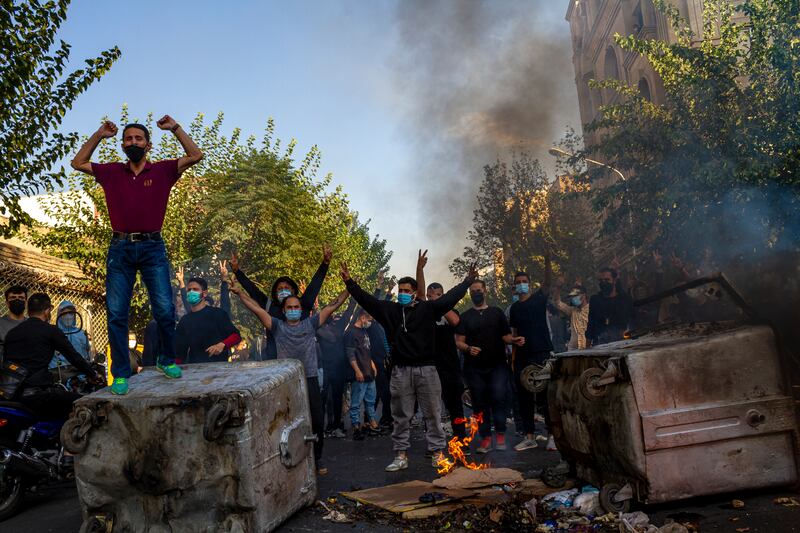A new alliance of autocratic leaders is aiming to reshape the geopolitical landscape in the Middle East and even in the world in unprecedented ways.
In a remarkable feat of political maneuvering, the diplomatic relations between Iran and Saudi Arabia were recently reestablished after eight years of tension and conflict. The successful deal was a careful balancing act, as both sides found terms to satisfy their needs. Iran, hoping to quell domestic unrest, wanted to curb the influence of Saudi-funded Iran International, a London-based satellite channel critical of the Iranian regime. Meanwhile, Saudi Arabia was desperate for a face-saving exit from proxy wars in Yemen and Syria. China and Russia, too, were determined to protect their investments in the Middle East.
The protests currently taking place in Iran are a major source of concern for both Russia and China, as their respective interests could be severely impacted if the protests lead to a revolution. A successful revolution could cause disruption in supply chains and economic relations, leading to a considerable decline in Russian and Chinese trade and investments in Iran.
Russia and China have substantial financial ties with Iran, particularly in the areas of oil, gas and military equipment. China has signed a 25-year trade pact with Iran, promising more than $400 billion in investments and purchase of Iranian oil. Likewise, Russia has invested heavily in Iran’s energy, transportation, infrastructure and industry sectors. Russia’s investments in Iran over the past few years have totaled around $30 billion. According to the World Bank, trade between Saudi Arabia and Russia in 2022 was more than $1.75 billion, and trade between Saudi Arabia and China came to $68.6 billion in the same year.
The Iranian Revolution of 1979 left a significant imprint on the security of the Persian Gulf, a geopolitical fact well understood by the Saudis and the Arab states today. Another revolution would have even greater implications for Saudi Arabia and the other Arab regimes.
Russian President Vladimir Putin, Saudi Arabia’s Crown Prince Mohammed bin Salman (known as MBS), Iran’s Supreme Leader Ali Khamenei and Chinese President Xi Jinping are united by visions of power. Putin dreams of reincarnating the former Russian federation. MBS wants to modernize the Arab/Muslim world, transforming the region by dispensing with antiquated traditions and customs. Khamenei is extolled by his regime as “Vali-ye Amr-e Moslemin,” the leader of the Muslim world, anointing him with far-ranging authority, and Xi is determined to turn China into the biggest player on the world stage, according to China-watcher Lee Kuan Yew.
Three of these leaders — Putin, Xi, Khamenei — are heirs to revolutions that shaped world history: the Russian Revolution of 1917, the Chinese Revolution of 1949, and the Iranian Revolution of 1979. They sit on more than 75 billion metric tons of petroleum reserves and trillions of cubic meters of natural gas reserves while harboring billions of dollars in cash.
Perhaps most worrisome, however, are their strategic locations. Iran has sea and land borders with 16 countries, Russia and China have borders with 14 countries each and Saudi Arabia with 13 countries. Without accountability, they can work out agreements and deals with impunity, challenging traditional world powers and showcases of democracy, including the United States.
The youngest leader in the axis, Mohammed bin Salman, wields immense power within his kingdom, ranging from social reform to foreign policy. Faced with Saudi Arabia’s urgent need to reduce its economic dependence on fossil fuels, MBS has promulgated a long-range blueprint, Vision 2030, to transform Saudi Arabia into a modern society and superpower. In this endeavor, he regards the Chinese government as a significant ally and actively recruits Chinese companies.
The crown prince showcased his ambition at the 2022 Future Investment Initiative Forum attended by 6,000 investors, entrepreneurs and government officials under the slogan of “Bringing Forth a New World Order.” While Biden administration representatives were notably absent, high-profile American CEOs were present.
In his book “World Order,” Henry Kissinger offered this thought-provoking observation: “What passes for order in our time was devised in Western Europe nearly four centuries ago, at the Peace of Westphalia, a conference conducted without the involvement or even the awareness of most other continents or civilizations.”
Today the four autocrats have taken advantage of vacuums created in the present global order. They have capitalized on the decline in the United States’ standing in global politics and its failure to provide a global vision that upholds the values of a rule-based international order, such as respect for human rights, democratic governance, and territorial integrity.
Seizing an opportunity, in February 2022, Putin invaded Ukraine in what many geopolitical observers regard as just a first incursion in expanding Russian dominance in Europe. He is supported by MBS, Xi and Khamenei, who watch with anticipation to make their own moves, ready to stifle any internal opposition in their homelands.
The threat demands that the United States and the rest of the West meet this challenge with an alternative global vision. The grim alternative is to watch the West’s influence continue to decline and allow these four states to construct their global order to the detriment of millions of people.
Bahman Baktiari is an expert on Iran and Middle East politics, serving as the executive director of the Baskerville Institute in Salt Lake City. He holds a doctoral degree in government from the University of Virginia and has published extensively on Iran and the Middle East.

